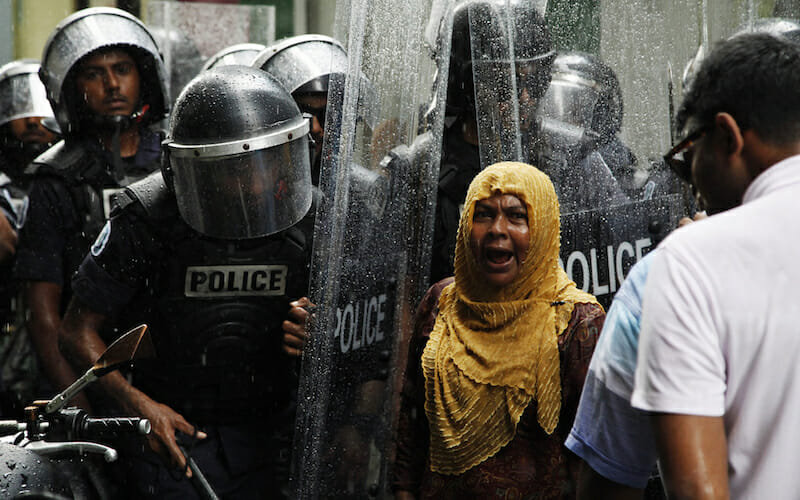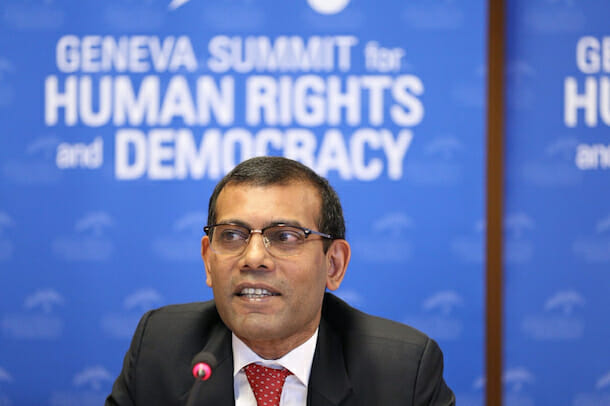
Escaping the Hydra’s Grip: Exiled Opposition Leaders’ Fight to Reform their Countries
The news has been full lately of autocratic leaders willing to go to any lengths to cling to power. The Maldives is daily sinking deeper into a political crisis that has seen protesters and opposition politicians arrested, international lawyers detained and deported, and the Supreme Court’s chief justice sacked. The Democratic Republic of the Congo (DRC) teeters on the edge of tragic chaos and utter disaster, as President Joseph Kabila unconstitutionally remains in power more than a year after the end of his term. Meanwhile, Djibouti has put the capstone on years of dubious deals and legal battles by forcibly seizing control of a Dubai-run port.
The despotic leaders of these countries have so brutally cracked down on any threat to their rule that the situation often seems hopeless. Mohamed Nasheed, the Maldives’ first democratically elected president, wrote in a New York Times op-ed the day after he was forced to resign at gunpoint: “At times, dealing with the corrupt system of patronage the former regime left behind can feel like wrestling with a Hydra: when you remove one head, two more grow back.” And yet, even so soon after being deposed, Nasheed remained optimistic, continuing: “With patience and determination, the beast can be slain.”
Six years later, Nasheed remains devoted to his quest to slay the beast which has his country by the throat, though he’s had to move the fight to London, where he was granted political asylum in 2016 after being jailed for trumped-up terrorism charges. The Maldives’ Supreme Court’s ruling on February 1st, 2018 to overturn these charges, to order the release of nine political prisoners and the reinstatement of sacked opposition politicians is at the heart of the country’s current crisis. Current leader Abdulla Yameen’s government has instituted a state of emergency, which Yameen has exploited to suspend fundamental rights including freedom of assembly and detainees’ rights.
Yameen’s goons have taken ample advantage of the sweeping powers the state of emergency gives them to make arrests and search and seize private property. Yameen has thrown his own half-brother Maumoon Gayoom, who ran the country from 1978 to 2008, in prison, charging him with attempting to overthrow the government. Security forces in full tac gear stormed the Supreme Court, arresting two senior judges.
Following his acquittal from the bogus charges he was fighting, Nasheed announced his intention to return from exile to contest elections. In the meantime, he has denounced the disintegration of the rule of law from overseas, particularly calling on India to send troops, if necessary, to stabilize the situation, and asking the US to block Yameen’s financial transactions. He travelled to India to brief the Indian Minister of Defence on the situation.

Leading the fight from abroad is undoubtedly frustrating, but it would be difficult—if not dangerous— for Nasheed to return home without international support in the current political climate. Fellow DRC opposition leader Moïse Katumbi knows all about that: just last week, he attempted to get a new passport at the DRC embassy in Brussels, but his application was denied. It’s not the first time Katumbi’s attempts to return to his country to stand for election have been thwarted. In 2016, DRC authorities refused to clear a plane he was on for landing.
More recently, Katumbi tried to charter a private plane to participate in the massive protests on New Year’s Eve 2017, in which Kabila’s security forces fatally shot at least seven people, but the government wouldn’t give him authorisation to land. Compounding the problem, Katumbi explained in an interview with the magazine Jeune Afrique that commercial airlines wouldn’t sell him a ticket to Kinshasa. Katumbi admitted that he could understand their concerns and assumed responsibility for the safety of his fellow passengers, lamenting: “This government fires into churches. What would stop them from shooting down a plane?”
The Maldives and the DRC have distinguished themselves for their leaders’ vicious desperation to hold onto their positions at any cost and total abandonment of the rule of law, but they are by no means the only countries which have sent their best hopes to watch from exile as they become embroiled deeper in corruption and chaos. The tiny but strategically located African nation of Djibouti was in the news recently for all the wrong reasons: autocrat Ismail Omar Guelleh, who has been ruling the country since his uncle stepped down in 1999, pulled off a one-two punch. In the span of only 24 hours, Guelleh claimed a landslide victory in farcical legislative elections and illegally seized a valuable port run by Emirati company, DP World. Guelleh may not yet have achieved Kabila’s level of depravity by shooting down churchgoers, but his regime has racked up its share of atrocities: savagely beating opposition journalists and restricting basic rights, from freedom of assembly to the denial of fair trials.
Yet again, it’s fallen to the exiled opposition leader Abdourahman Boreh to denounce these abuses. Brought before the London high court on trumped up corruption charges, Boreh not only successfully defended himself but produced evidence demonstrating how Guelleh had progressively seized the majority of Djibouti’s wealth for himself and his family. As Boreh explained in court that his country was “ruled by one man who uses the resources of the state to persecute anyone who stands against him,” he begged the African Union, the United States and France to intervene.
This appeal went largely unanswered, as have Nasheed and Katumbi’s calls for international support. The West has its own interests in these countries and tends to prefer so-called stability over standing up for what’s right. This willingness to turn a blind eye has left the Maldives, the DRC, and Djibouti to suffer dark days. And yet, for each of these troubled nations, opposition leaders in exile cherish a vision of a different kind of government, ready to return to their countries and start tackling their problems—if only someone would lend them a hand.

